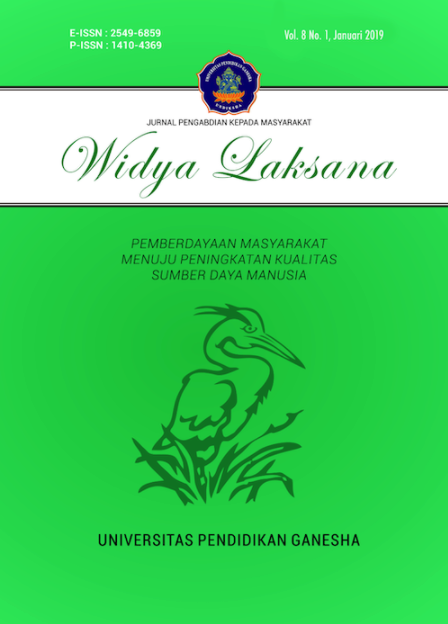PENINGKATAN KEMAMPUAN GUIDING PADA POKDARWIS ALAM PUNCAK LANDEP MELALUI PELATIHAN BERLANDASKAN FALSAFAH TRI HITA KARANA
DOI:
https://doi.org/10.23887/jwl.v10i1.28198Abstract
The growing number of tourists with special interests, namely sport tourism, especially trekking activities combined with cultural attractions/local wisdom encourages efforts to improve the quality of tour guides. Pokdarwis Alam Puncak Landep was formed to sell service businesses in the field of guidance that do not have the knowledge and understanding of: (1) potential cultural attractions that can be combined with trekking activities, (2) guiding procedures based on the local wisdom, (3) English language skills. To that end, trekking guiding training has been conducted based on the tri hita karana philosophy. The purpose of this training is to improve guiding skills based on the tri hita karana philosophy. The method used is discussion and practice. The results of the training show that there is an increase in knowledge and understanding of combining cultural attractions with trekking activities and practicing guiding procedures combined with using English. Thus, pokdarwis can improve their guiding ability through training based on the tri hita karana philosophy.Downloads
Published
2021-03-01
Issue
Section
Articles
License
Authors who publish with the Widya Laksana agree to the following terms:- Authors retain copyright and grant the journal the right of first publication with the work simultaneously licensed under a Creative Commons Attribution License (CC BY-SA 4.0) that allows others to share the work with an acknowledgment of the work's authorship and initial publication in this journal
- Authors are able to enter into separate, additional contractual arrangements for the non-exclusive distribution of the journal's published version of the work (e.g., post it to an institutional repository or publish it in a book), with an acknowledgment of its initial publication in this journal.
- Authors are permitted and encouraged to post their work online (e.g., in institutional repositories or on their website) prior to and during the submission process, as it can lead to productive exchanges, as well as earlier and greater citation of published work. (See The Effect of Open Access)



